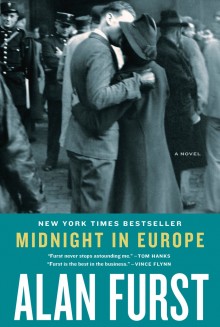Night Soldiers: the World of Alan Furst November 20, 2016
Author: Beach Combing | in : Contemporary , trackback
Europe from 1933-1945, from Hitler’s arrival in office to the moment that the moustached one ends his life with a pistol in the bunker. What a truly remarkably, ear-splittingly screwed up continent! We travel from De Valera’s theocratic Ireland dancing hopelessly at the crossroads, to men, women and children being taken downstairs to be shot in Soviet cellars: Beach always thinks of the mops and bucket brought out as the bodies are dragged away. Off the top of his head Beach can’t come up with anywhere better to set a series of books in our sorry history, other than perhaps the Roman Empire. The world of Game of Thrones or Middle Earth fades in contrast to the Iron Guard, Finnish snipers, Polish uhlans, Russian commissars, and Shire Tories. It is as if someone had written the most colourful list of Dungeon and Dragons monsters imaginable and put some very good Duracell batteries in the back of these toys and set them wandering. Now how best to take advantage of the fictional possibilities? Love, sex, food, violence, torture, politics… Yes, yes, yes. All good. But how do you string these together? Well, espionage of course. You take heroes and heroines who are dragged into the wake of SIS, the Gestapo, the NKVD, the Deuxième Bureau and others and who serve their country or more often other people’s countries by stealing, sleeping, stabbing, bombing and talking their way across a dozen nations.
Welcome to the world of Alan Furst: fourteen spy novels and counting set on this beautiful, disintegrating strand of earth. Of course the advantage of having the same setting and the same years is that time and time again the same characters appear, a hero in one novel, becomes a chance meeting in another… Furst himself enjoys rolling the old theatre sets back out onto the stage. There is, to take an extreme instance, one table in a Parisian restaurant that appears in each novel. Beach has read eleven of these books in three weeks and, as always when you spend too much time in the company of one author, you start to recognize the tics. The heroes are of a type: sensitive, quietly decent men, very successful in bed naturally, who are brought by the gravity of events to flow downwards towards goodness and resistance and quickly learn the limits of the same. There is no James Bond nonsense, Doctor No and a thousand crocodiles in an island retreat. It is never clear whether this or that espionage plot will work: sometimes in Furst’s world they do, sometimes they fizzle out. This produces real tension. In fact, Beach forever left part of himself on a boat on the Danube on a secret SIS mission run by a Russian operative controlled by a Hungarian out of Istanbul. The tension was overwhelming when the enemy searchlights flicked on… Did the mission deliver success? You’ll have to read and find out.
Strangehistory has offered tens of reviews over the years but this is the first time that Beach has ventured into fiction. This will emphatically not become a habit: the very idea! It is just that he has had such a good time in the last twenty days and some of his interest in this twilight Europe will certainly be shared by long time readers. One of the costs of covering so many different cultures and countries is that Furst can sometimes offer rather stereotyped versions of Europe’s cacophony of nations. But they are, let’s say, convincing stereotypes. Furst speaks, for instance, of the ‘audible melancholy’ of the Czechs. There are also some excellent asides on the ruthlessness of the British: one delicious paragraph describes two German operatives who end up on opposite sides of the street when they foolishly dismantle a booby-trapped British radio set. Fair play, what!
Any good history books, preferably not fiction: drbeachcoming AT yahoo DOT com


